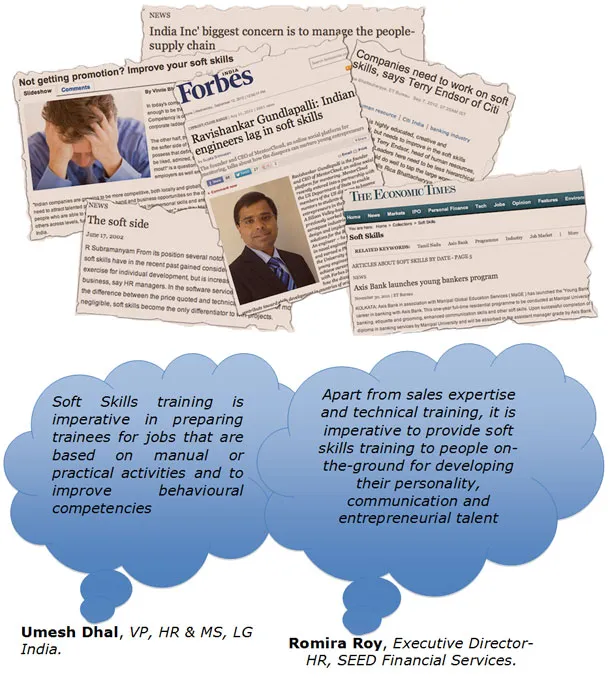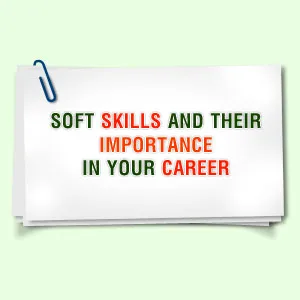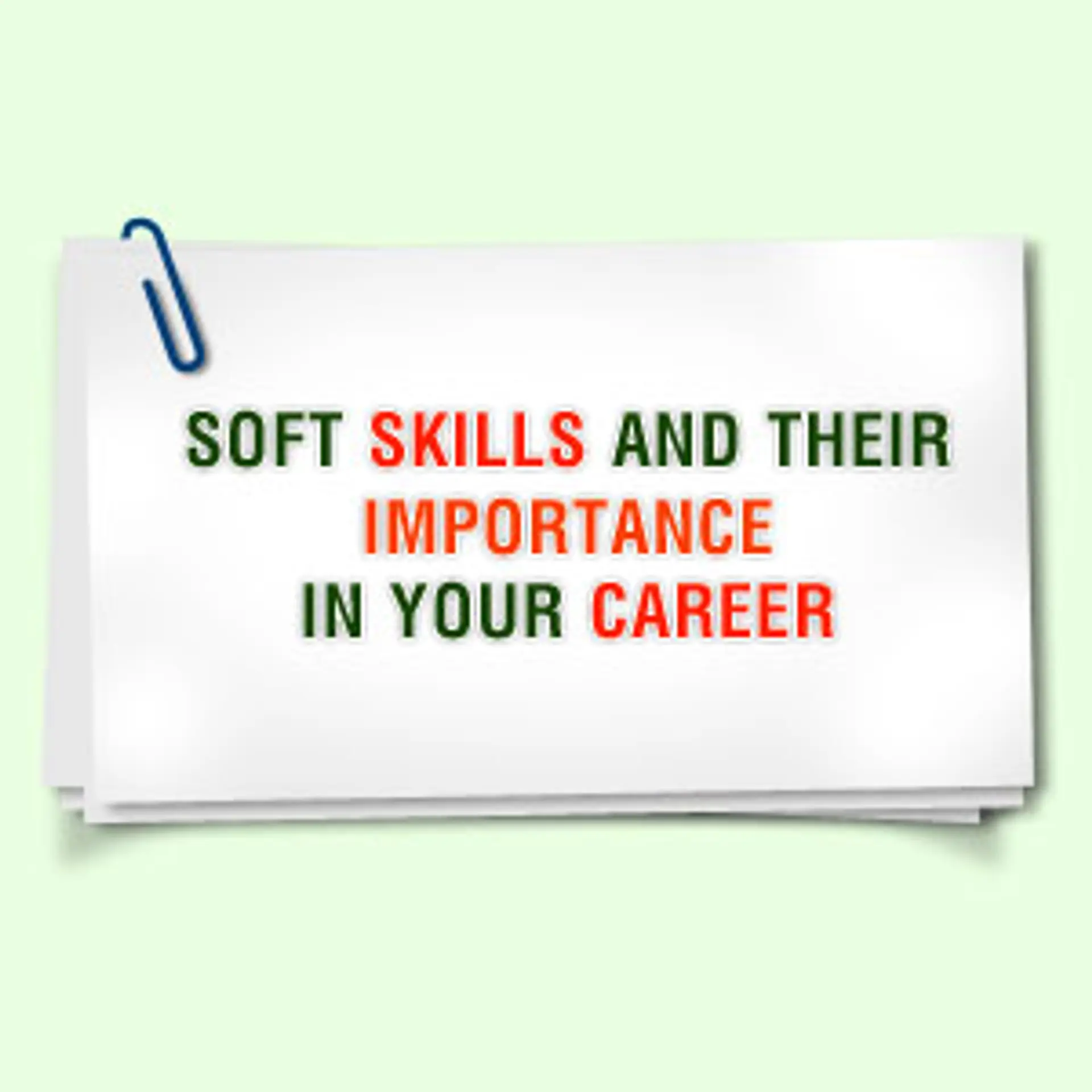Drilling Down on Soft Skills; How Important Are They?
One of the fashionable terms floating around these days is “soft skills”. But what exactly are soft skills? Why is there a need to develop these skills and incorporate them into your professional armour? If you do identify the need for these skills how do you go about acquiring them? Is there a method to the madness? Or are soft skills playing ‘hard to get’?
What are soft skills?
‘Skill' as defined by the Oxford Dictionary is “The ability to do something well”. Soft skills can be said to incorporate all aspects of generic skills that include the cognitive elements associated with non-academic skills. Soft skills are identified to be the most critical skills in the current global job market especially in a fast moved era of technology. And management gurus relate soft skills to emotional quotient and define soft skills as ‘a cluster of personality traits'.

A distinction is maintained between soft skills and hard skills. While hard skills refer to technical and academic skills, soft skills refer to wide-ranging personal and interpersonal skills. Academic and technical skills can be more easily defined, observed and measured. However, the measurement of personal and interpersonal skills requires complex factors. These are difficult to define, observe and measure and hence they are intangible. Vast research and expert opinions have been sought in the effort to determine the specific soft skills to be implemented and used in higher institutions of learning. Based on the research findings obtained, seven soft skills have been identified and chosen to be implemented in all institutions of higher learning here. They are:
- Communicative skills
- Thinking and Problem solving skills
- Team cohesion and Team management skills
- Life-long learning and Information Management
- Entrepreneur skills
- Ethics, morality and professionalism
- Leadership skills
The Indian Scenario
There is enormous and spectacular growth in well-paying job opportunities, a huge number of engineering and other graduates are produced every year, but there is a severe dearth of employable graduates. The globalization of the industries and the consequent spurt in the job scene has suddenly found us wanting in the area of soft skills; the recent NASSCOM report endorses this fact by stating that 75 % of the engineers are not employable since the focus is always on academics and theory.
Though the soft skills crisis is a universal phenomenon, the problems and reasons in the Indian subcontinent are peculiar because for the following reasons:
- Our educational system is so designed forcing students to concentrate more on rote learning than on developing a spirit of enquiry, which is the most predominant factor to achieve success at work place.
- During their high school education, many engineers would have neglected studying humanities, languages and arts. In this process, an all-rounded development of complementary human intelligences and faculties like creativity and inter-personal skills is stunted.

Need of the Hour
The most important endorsement for soft skills is the sheer number of unemployed graduates not only in our country but the world over. Certification, education and technical ability are essential to help you get in line for the job but you need soft skills to create opportunity for yourself. What is the use of your academic/technical ability if nobody knows you’ve got such skills? The essence of education is opportunity. The essence of your technical ability is opportunity. This opportunity can materialize only with the command over soft skills. It sets you a step higher and makes you stand out of the crowd. Having the required interpersonal skills provides a must-have foundation for career growth. They give you the ability to take advantage of challenges and opportunities that will come your way. Your hard skills get you in the running and your soft skills get you noticed. Together, you achieve success!
Soft skills are essential for career progression. If you can’t communicate well with colleagues or clients you might come across as incompetent, even though your technical ability is far superior to others. But when you interact better with the people you have to work with, yourperformance tends to improve and they go away with a positive impression. And the meaning of positive impression is more opportunity, more responsibility.
However, the main benefit of soft skills is empowerment. How does your tech skill translate to value? How do you create opportunity? Soft skills are useful for creating and taking advantage of opportunities – jobs, career and business. No matter how great your ability is, when job hunting, your marketing skills should be first-class. The issue at stake is this: can you convince the interviewer or clients that you will solve their problems and deliver value? Otherwise others who may not be as capable as you, but who have better marketing skills might beat you to the jobs or work you want. There are opportunities but there are also challenges and competition. In such a competitive environment, perception often reigns supreme.
It’s a habit, not theory!
Soft Skills are a gradual change that slowly gets imbibed into your character. Just like academic skills and technical skills have to be honed, practice helps master soft skills. The first step in developing good soft skills is to unlearn the negative traits developed and relearn. Unless they have seen success in applying a new skill or method, they are not convinced that a change is required. Training programs can be effective but must include individual and effective assessments to gauge the deficit of soft skills and then work to fill in those voids. It is important to understand the abilities and emotional intelligence of learners before imparting some sort of training. The learner must understand that the training is never final and soft skills take time to be developed. One should usually persevere to put a skill learnt in practice so that it becomes a habit and seeps into one's behavior.
Author Credits -
Last-Bench! provides customized courses for taking on the big bad professional world. Last-Bench! shifts the focus away from the scary external environment and enables you to focus on yourself and through their bouquet of well researched and prudently designed courses you are ready to take on the professional playground with a holistic approach.
To learn more visit www.last-bench.com
This article was provided by Last-Bench!



